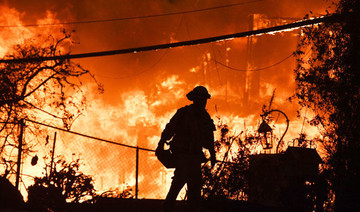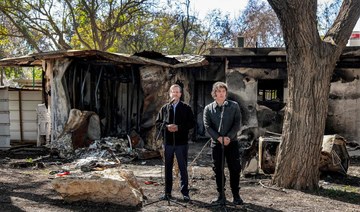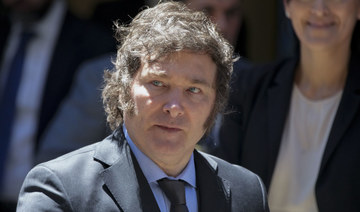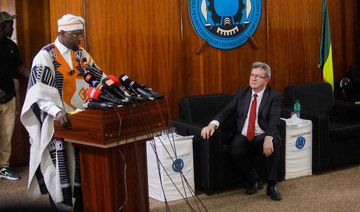CHICO, California: The first significant rain in months in northern California helped firefighters battle the deadliest wildfire in the state’s history on Wednesday, but raised the risks of flash flooding that could hinder teams searching for human remains.
Between 4-6 inches (15 cm) of rain was expected to fall through the weekend in areas around the town of Paradise, the community of nearly 27,000 people 175 miles (280 kilometers) northeast of San Francisco that was largely incinerated by the Camp Fire. The blaze killed at least 81 people, and 869 are still unaccounted for.
The rain added to the misery of evacuees camped out in a Walmart parking lot in nearby Chico, where local residents donated freight pallets and tarps to help evacuees shelter from overnight temperatures just above freezing.
“I’ll get a pallet and get my tent up off the ground,” said Mitchell Manley, who evacuated from the village of Concow and managed to get his elderly mother out of nearby Magalia.
Warehouses were being opened up in Chico to provide evacuees protection from the cold and rain and to move them out of the Walmart car park, said Manley’s partner, Carol Daugherty.
Forecasters said the rains, which in some areas are likely to be accompanied by winds of up to 45 miles per hour (72 kph), raised risks of debris flows. The fire has burned across 153,000 acres (62,000 hectares) of the Sierra foothills.
“There’s no vegetation to hold the earth and there’s a risk it could just start moving, with mud carrying everything in its path,” said National Weather Service forecaster Johnnie Powell in Sacramento.
Firefighters installed straw tubes known as wattles to stop hillsides being washed away and were hoping to have the fire fully contained by the weekend, said California Department of Forestry and Fire Protection spokeswoman Erica Bain.
Mass evacuations since the fire erupted on Nov. 8 have removed most people away from any debris flow, National Weather Service (NWS) hydrologist Cindy Matthews said.
Authorities in Butte County, where Paradise is located, have been gradually allowing residents evacuated during the fire back to see what is left of their homes.
Lisa Knight found only ash and rubble when she returned to her house in Butte Creek Canyon, east of Chico.
“I mourn for everybody. It’s not just one personal loss, it’s the loss of my neighbors and my community,” Knight told KRCR-TV.
The remains of two more victims were found in Paradise on Tuesday, raising the death toll to 81. The Butte County Sheriff’s Office has tentatively identified 56 of the victims.
The number of missing persons has fluctuated widely over the past week, from some 1,200 people over the weekend to fewer than 700 on Monday, as more individuals were reported missing and some who initially were unaccounted for either turned up alive or were confirmed dead.
The number of residents needing temporary shelter was unclear, but as many as 52,000 people were under evacuation orders at the height of the firestorm last week.
The Camp Fire incinerated 13,503 homes in and around Paradise. The cause of the fire remains under investigation.
Flash flood risk in California wildfire zone as rain douses flames
Flash flood risk in California wildfire zone as rain douses flames

- Rain has helped extinguish fire that ravaged through the weekend in areas around the town of Paradise
- The wildfire killed at least 81 people, and 869 are still unaccounted for
Nearly 10,000 evacuated in Ukraine’s Kharkiv region: governor

- Ukrainian President Volodymyr Zelensky plays down Russia’s gains in the offensive
- Moscow has been attacking several settlements including Vovchansk, just five kilometers from the border
The assault may only be the first wave of a wider offensive, Ukrainian President Volodymyr Zelensky said.
Over a week after its launch, “a total of 9,907 people have been evacuated,” governor Oleg Synegubov said.
They were fleeing Russian soldiers who managed to advance between five to 10 kilometers (three to six miles) along the northeastern border before being stopped by Ukrainian forces.
Synegubov said Ukraine’s armed forces had repelled two attempts to break through defenses overnight.
The situation was “under control” with “defenders in certain areas conducting assault... and combing operations.”
Moscow has been attacking several settlements including Vovchansk, just five kilometers from the border.
“In the area of the city of Vovchansk, Ukrainian troops are reinforcing their defense,” Synegubov said.
A day earlier, he said Russian forces have started to destroy Vovchansk and all but 200 of its residents have fled due to fighting.
Russian forces have taken 278 square kilometers (107 square miles) between May 9 and 15, their biggest gains since the end of 2022, AFP calculated using data from the Institute for the Study of War (ISW).
Russia’s offensive “could consist in several waves. There was the first wave” in the Kharkiv region, Zelensky said journalists.
Zelensky played down Russia’s gains in the offensive but added: “We have to be sober and understand that they are going deeper into our territory. Not vice versa. And that’s still their advantage.”
Speaking about the offensive during a visit to China on Friday, Russian President Vladimir Putin said it was a response to Ukraine shelling border regions.
Nepal latest to ban Indian spice brands over safety concerns

- Hong Kong, Singapore last month banned products from Everest and MDH after tests detected presence of ethylene oxide
- Besides its use as a pesticide, ethylene oxide is used to sterilize medical equipment and as a sterilising agent in spices
KATMANDU: Nepal has become the latest jurisdiction to ban the import and sale of two popular Indian spice brands after reports that some of their products contained a cancer-causing pesticide, officials said Friday.
Hong Kong and Singapore last month banned products from Everest and MDH — two brands popular in India and exported worldwide — after tests detected the presence of ethylene oxide, according to media reports.
Besides its use as a pesticide, ethylene oxide is used to sterilize medical equipment and as a sterilising agent in spices to prevent illnesses caused by salmonella and E. Coli bacteria.
Regular exposure to the colorless and odourless compound increases the “risk of cancers of the white blood cells,” according to the US Environmental Protection Agency.
Matina Joshi Vaidya, chief of Nepal’s Department of Food Technology and Quality Control, told AFP that the Himalayan country had also decided to halt the sale of the spice blends.
“It is an issue of public health,” she said. “We have its banned import and sale from Thursday.”
Nepal has banned four products — three variants produced by MDH and one by Everest.
“We do not have the lab resources to run the tests in the country. The ban will be lifted when Indian authorities declare it safe,” Vaidya said.
Everest and MDH are India’s top two spice brands with a market share of 16 and 10 percent respectively in 2022, according to consumer research monitor Statista.
Both companies have put out statements denying their products pose a health hazard to consumers after the Singapore and Hong Kong import bans.
“We clarify and state unequivocally that these claims are untrue and lack any substantiating evidence,” MDH said last month on social media platform X.
India’s food regulation agency has asked for state authorities to carry out random testing of spice products, broadcaster NDTV reported.
Argentine president begins unusual visit to Spain, snubbing officials and courting the far-right

- The brash President Javier Milei has no plans to meet Spain's PM — nor any other government official
- He will instead attend a far-right summit Sunday hosted by Sánchez’s fiercest political opponent, the Vox party
BUENOS AIRES, Argentina: Even before kicking off a three-day visit to Madrid on Friday, Argentina’s libertarian President Javier Milei stirred controversy, accusing the socialist government of bringing “poverty and death” to Spain and weighing in on corruption allegations against the prime minister’s wife.
In such circumstances, a typical visiting head of state may strive to mend fences with diplomacy.
Not Milei. The brash economist has no plans to meet Spanish Prime Minister Pedro Sánchez during his three days in the Spanish capital — nor the Spanish king, nor any other government official. Instead, he’ll attend a far-right summit Sunday hosted by Sánchez’s fiercest political opponent, the Vox party.
The unorthodox visit was business as usual for Milei, a darling of the global far right who has bonded with tech billionaire Elon Musk and praised former US President Donald Trump. Earlier this year on a trip to the United States, Milei steered clear of the White House and took the stage at the Conservative Political Action Conference, or CPAC, where he railed against abortion and socialism and shared a bear hug with Trump.
Milei presented his 2022 book, “The Way of the Libertarian,” in Madrid Friday at a literary event organized by La Razón, a conservative Spanish newspaper.
The book — withdrawn from circulation in Spain earlier this month because the back-flap biography erroneously said Milei had earned a doctorate — traces his meteoric rise in politics from eccentric TV personality to national lawmaker and outlines his radical free-market economic ideas.
To thunderous applause, Milei condemned socialism as “an intellectual fraud and a horror in human terms.”
“The good thing is that the spotlight is shining on us everywhere and we are making the reds (leftists) uncomfortable all over the world,” Milei said.
He took the opportunity to promote the results of his harsh austerity campaign in Argentina, celebrating a decline in monthly inflation in April though making no mention of the Buenos Aires subway fares that more than tripled overnight.
Repeating a campaign pledge to eliminate Argentina’s central bank — without giving further details — Milei promised to make Argentina “the country with the most economic freedom in the world.”
At the event Milei gave a huge hug to his ideological ally Santiago Abascal, the leader of the hard-right Vox party and the only politician with whom Milei has actual plans to meet in Madrid.
The Vox summit Sunday seeks to bring together far-right figures from across Europe in a bid to rally the party’s base ahead of European parliamentary elections in June. Milei described his attendance a “moral imperative.” He also has plans to meet Spanish business executives Saturday.
Tensions between Milei and Sánchez have simmered since the moment the Spanish prime minister declined to congratulate the libertarian economist on his shock election victory last November.
But hostility exploded earlier this month when one of Sánchez’s ministers suggested Milei had taken narcotics. The Argentine presidency responded with an unusually harsh official statement accusing Sánchez’s government of “endangering the middle class with its socialist policies that bring nothing but poverty and death.”
The lengthy government statement also accused Sánchez of having “more important problems to deal with, such as the corruption accusations against his wife.”
The allegations of influence peddling and corruption brought by a right-wing group against Sánchez’s wife, Begoña Gómez, had prompted Sánchez, one of Europe’s longest serving Socialist leaders, to consider stepping down.
Senegal’s new president welcomes challenge to help reconcile ECOWAS with Mali, Burkina Faso, and Niger

- Ghana’s President Akufo-Addo sought Bassirou Diomaye Faye's help during their meeting in Accra on Friday
- Faye said that he hoped to convince the countries to “come back and share our common democratic values and what we stand for”
ACCRA: Ghana’s president Friday urged his visiting Senegalese counterpart to use his goodwill within the Economic Community of West African States to help resolve disputes with Niger, Burkina Faso and Mali.
President Bassirou Diomaye Faye arrived in the capital Accra early in the morning after visiting Nigeria’s President Bola Ahmed Tinubu.
Niger, Mali and Burkina Faso in January 2024 announced they were leaving ECOWAS after they were suspended by the group over military coups in all three nations.
“We are lucky to have a new leader in place because I think he is also going to help us to try and resolve the big problem that we have in the ECOWAS community,” Ghana’s President Nana Akufo-Addo said after meeting Faye.
“President Faye is very committed to seeing what he and the rest of us can do to reach out and revive the dialogue.”
Speaking to reporters after bilateral talks, Akufo-Addo said Faye had demonstrated commitment to ECOWAS efforts to bring the three countries to the table for further talks and back to the bloc.
Faye, 44, won a resounding victory as an anti-establishment candidate promising major reforms to become Senegal’s youngest-ever president.
His election has been seen as an inspiration for change in contrast to some of the continent’s aging leaders who have been in power for years and to other countries now run by military governments.
He welcomed the challenge to help reconcile ECOWAS with Mali, Burkina Faso, and Niger.
ECOWAS “is going through difficult times but we are going to do all we can to consolidate the gains made in integration, in a spirit of common, fraternal solidarity,” Faye told reporters.
Unity was “primordial” in the region, he added.
Earlier in Nigeria, Faye said that alongside Nigeria, which currently chairs ECOWAS, he hoped to convince the countries to “come back and share our common democratic values and what we stand for.”
Nancy Pelosi’s husband’s attacker jailed for 30 years

SAN FRANCISCO: A man who attacked the elderly husband of former US House Speaker Nancy Pelosi with a hammer was sentenced Friday to 30 years in prison.
David DePape was convicted last year of breaking into the couple’s San Francisco home and bludgeoning Paul Pelosi in a horrifying attack captured on police bodycam.
At the time of the October 2022 assault, Democrat Nancy Pelosi was second in line to the presidency and a regular target of outlandish far-right conspiracy theories.
Jurors in his trial last year heard how DePape — a Canadian former nudist activist who supported himself with occasional carpentry work — had initially planned to target Nancy Pelosi, planning to smash her kneecaps if she did not admit to her party’s “lies.”
On arriving at their home armed with rope, gloves and duct tape, DePape instead encountered her then-82-year-old husband, and kept asking, “Where’s Nancy?“
During what DePape told officers was a “pretty amicable” conversation with Paul Pelosi, the husband managed to call for help from law enforcement officers.
Moments later when police arrived DePape hit Pelosi with a hammer before officers rushed at him and took the weapon away.
Pelosi was knocked unconscious and had his skull fractured. He spent almost a week in a hospital, where he underwent surgery.
Nancy Pelosi was not at home the night of the attack.
Prosecutors had asked the federal court in San Francisco to sentence DePape to 40 years in prison.
In the lead up to Friday’s sentencing, Nancy Pelosi had asked the judge to impose a “very long” sentence for an attack that “has had a devastating effect on three generations of our family.”
“Even now, eighteen months after the home invasion and assault, the signs of blood and break-in are impossible to avoid.
“Our home remains a heartbreaking crime scene,” she wrote, according to court documents cited by the San Francisco Chronicle.
On Friday her office said the family was proud of Paul Pelosi “and his tremendous courage in saving his own life on the night of the attack and in testifying in this case.”
DePape had pleaded not guilty to charges that included assault on a family member of a US official, and attempted kidnapping of a US official.
While not denying the attack, his defense rested on contesting federal prosecutors’ claims that he had targeted Nancy Pelosi in her official capacity.
Instead, his lawyers argued that DePape was driven to target a number of prominent liberal figures, due to his exposure to a web of obscure conspiracy theories.
In social media posts, DePape shared QAnon theories and false claims that the last US election was stolen.
The trial heard how DePape did not intend to stop his supposed anti-corruption crusade with Pelosi, and had drawn up a list of other targets including a feminist academic whom he accused of turning US schools into “pedophile molestation factories.”
Other personalities the defendant admitted wanting to attack included California Governor Gavin Newsom, President Joe Biden’s son Hunter, and actor Tom Hanks.
Jurors took less than 10 hours to reject DePape’s explanation of the attack, which took place just a few days before the US midterm elections.
The attack itself became politicized in the weeks after it occurred, with some members of the Republican Party mocking the incident and suggesting lurid and unsubstantiated explanations for why there was a man in Pelosi’s house late at night.
US Attorney General Merrick Garland said Friday that DePape’s sentence should serve as a warning that attacks on political figures and their families were unacceptable.
“In a democracy, people vote, argue, and debate to achieve the policy outcome they desire,” he said.
“But the promise of democracy is that people will not employ violence to affect that outcome.
“The Justice Department will aggressively prosecute those who target public servants and their families with violence.”















